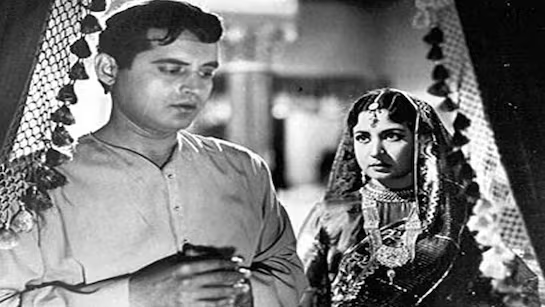Watching Pyasa was a futile effort some years ago. It was a torrid, Black & White film, excruciatingly slow-paced, and depressive in nature. In short, It lacked all the stimulants of the modern day. Whilst I waded through Pyasa in my urge to watch a classic, my recent experience with Sahib, Bibi Air Ghulam was different in many ways.
First, Sahib…is not as sombre as other Guru Dutt movies. It is technically not a Guru Dutt movie. He retired from directing after the debacle of Kagaz Ke Phool (another classic that we might talk about another day). Sahib… is a classic tale of people across social classes, their lives intertwined – a lonely, outcast daughter-in-law of a feudal family whose hedonistic husband is an epitome of debauchery, and an innocent villager who migrates to city in search of better life.
Sahib…is tragic. It’s a tragedy that fills your heart. The ending leaves you speechless. It celebrates women, and it ruthlessly shows their fragility and notions. The women of Pre-independence were bound by the duties of a wife, daughter-in-law, mistress and all that defined them.
Sahib…is seductive. Sensuality understandably could not be blatantly represented in 60s cinema, but the film has sensuality that goes beyond the need of the ephemeral pleasure of the flesh. It delves into the need of an eternal soul, a spiritual and emotional need that is the most difficult to transcend.
Sahib…is delicious. You cherish and relish the screenplay, the subtle expressions of each character, their dilemmas, their bindings to their duties, the vulnerability of money, the ebb and flow of a hackneyed thing called life.
On another note, what seems to be opposite of sadness, happiness was in my feed recently. I don’t mean a source of happiness, but a video by Palki Sharma that talked about happiness or lack of it. I have personally never really believed in happiness, as it has come to be defined, in most cases, from an external source. I believe in equanimity of mind, call it stoicism, or as ancient Yogis put it Chitta Vritta Nirodha, or the cessation of fluctuation of mind.
Interestingly, India ranks 139 in happiness index. I don’t know exactly the parameters of measuring but that is abysmally low. Well, I am not going to get into politics of that. I guess, if you are happy in the moment, you are happy eternally.

Somebody who has found hapiness eternally, has the capability to see and cherish- the near and dear one’s happiness. If something within you smiles, you can maybe call that hapiness too.
Over analysis of self… our reactions and feelings makes us control them more and more. Hence we question… What is so joyous about this… or that. Why are people sooo sad or so joyous… it certainly is over reaction.
In my opinion… One needs to free the space for experiences and allow to feel.